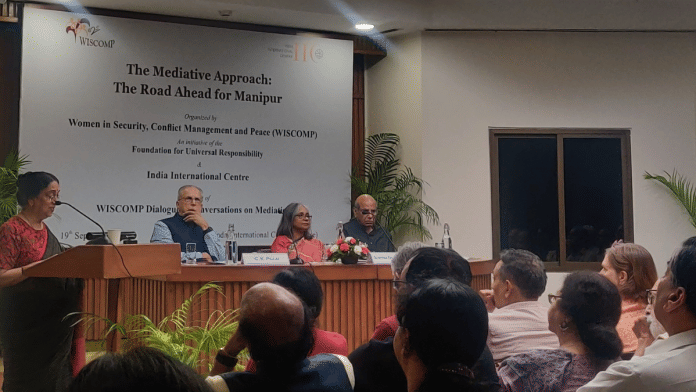A group of former civil servants huddled on a recent evening in Delhi to suggest solutions for restoring peace in Manipur. While they couldn’t definitely say what should be done, they were certain about what should not be done and were critical of both the central and state government’s approach.
Women in Security, Conflict Management, and Peace (WISCOMP), a non-profit, non-sectarian organisation based in Delhi, hosted a dialogue Thursday as part of its WISCOMP Dialogues: Conversations on Mediation series. Those present included former Home Secretary G.K. Pillai, former ambassador Shyam Saran, and Sumona Dasgupta, senior research consultant at WISCOMP. The event with an audience counting over 50 people also saw attendees from both the Kuki and Meitei communities.
Connect emotionally, don’t pass orders
During a press conference on 17 September, Union home minister Amit Shah stated that the government is engaging with both the Meitei and Kuki communities in conflict-stricken Manipur to restore normalcy. However, similar efforts in the past have yielded no success, as one or both sides often remained absent from the discussions — a point acknowledged by the speakers at the event.
“In the Northeast…you have to connect with the people; you can’t just issue an order and expect compliance. They won’t listen to you. Both communities have their own systems and grievances, which need to be addressed and respected. You can’t simply say: ‘Here’s an order, implement it.’ It doesn’t work that way. There is a lack of what I call an understanding of the Northeast in the Ministry of Home Affairs right now,” said Pillai.
Emphasising the need for “political will”, Pillai criticised the government’s decision to seal the Myanmar border. He pointed out the ineffectiveness of such measures, drawing a parallel to the Bangladesh border. “We’ve seen this with the Bangladesh border—it’s fully fenced, yet the wires are cut 800 times a day. That means, every day, someone slips through. People who talk about sealing the border are often those who have never actually seen it,” Pillai remarked.
Quietly seated among the audience was Manipur’s human rights activist Babloo Loitongbam who has been forced out of his state after facing multiple attacks last year. After listening to the discussions, he turned “little hopeful’ about the situation in his state.
Saran, reflecting on his experience in Myanmar, expressed a similar viewpoint about sealing the border. “Anyone familiar with these borders will tell you it’s nearly impossible. While there may be some areas where it’s feasible, vast stretches of dense forest make effective policing unmanageable. A significant amount of traffic continues to move back and forth without anyone being aware. Additionally, there are concerns about Chinese involvement, including historical smuggling of red sandalwood from India to China through Myanmar.”
Sumona, who has made several visits to Manipur since last year, emphasised that labelling the conflict as merely an ethnic clash is a “reductionist approach”. She referred to a concept in mediation known as omnipartiality, which means partial to all.
“Omnipartiality is the gold standard for those with a mediative mindset. It’s the only perspective that allows us to truly grasp the grievances and insecurities of all communities in Manipur and stakeholders, ultimately humanising their experiences,” she added.
A missing aspect
It has been over 15 months since the conflict began in the state, and a recent surge in violence has introduced loitering munitions and sophisticated weaponry, marking a more intense phase of the struggle.
Saran expressed confidence that if the coercive power held by both governments is utilised effectively, the situation can improve, highlighting that the challenges extend beyond community interactions to the implications of state involvement in the crisis. “We must be realistic enough to recognise that what we are facing is not merely a division or confrontation between the communities; it is a more complex issue,” he added.
Both Saran and Pillai emphasised the need for greater involvement of civil society organisations, not only to facilitate dialogue between the communities but also to assist those displaced in relief camps. They asserted that “demilitarisation” and “de-weaponisation” must occur till internally displaced persons (IDPs) can safely return to their villages.
However, a significant aspect missing from the conversation was the role of security forces. The recent surge in violence has led to counterclaims from the security forces, with the Manipur Police alleging the use of drones for bombing, while the Army reported finding no evidence of this. In response to a question from ThePrint, Saran clarified that when he mentioned bringing stakeholders together, he included the security forces in that dialogue.
Among the audience sat a Manipur resident, intently listening to the discussion. “If only these conversations could reach the ears of the current establishment, perhaps they could take appropriate action to help the state. But sadly, that will never happen,” she said.
(Edited by Humra Laeeq)






